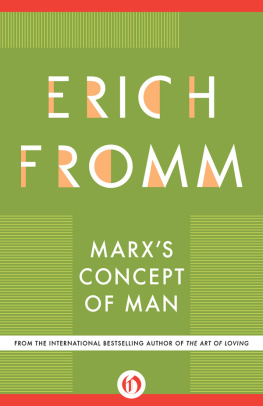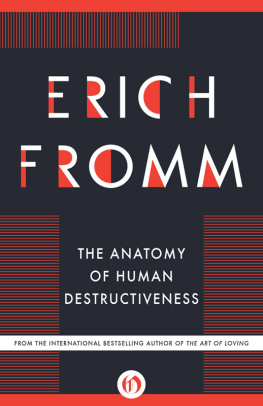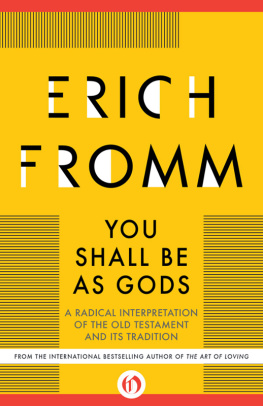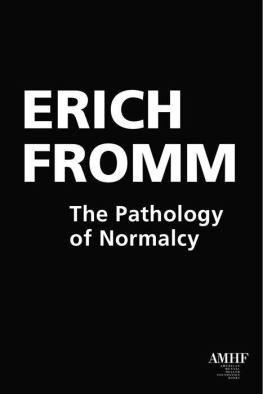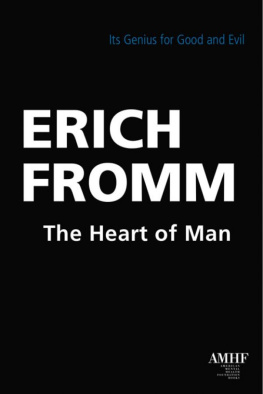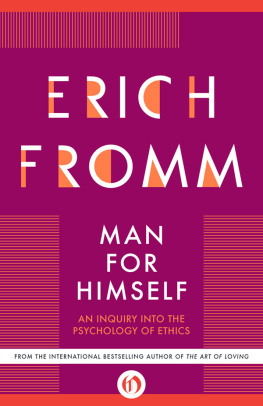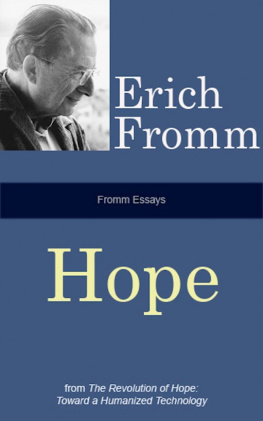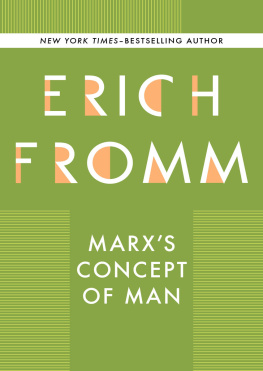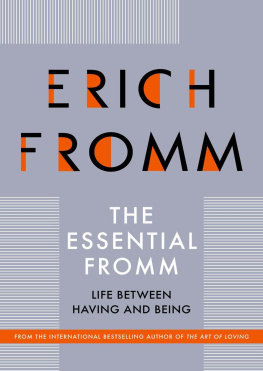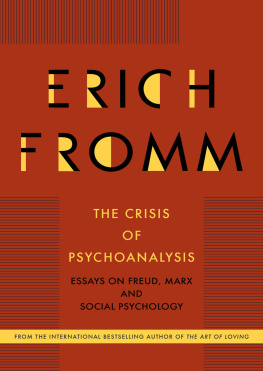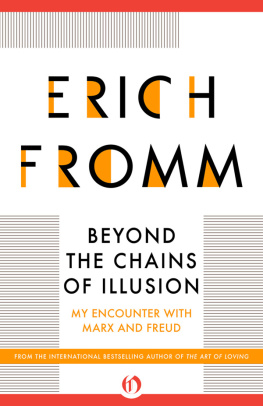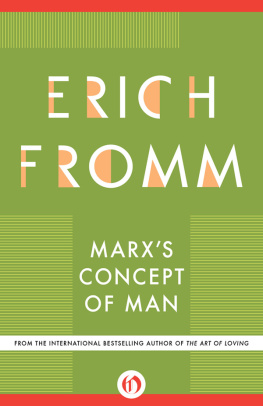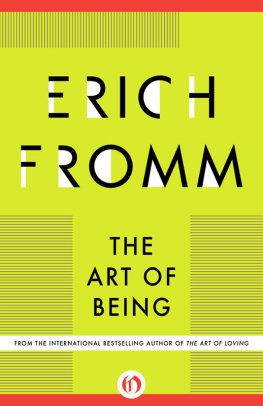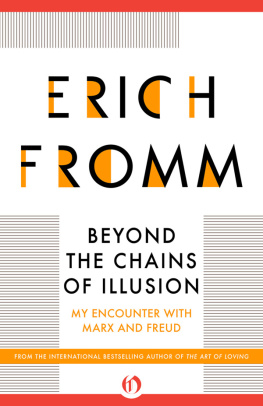Fromm - Marx’s concept of man
Here you can read online Fromm - Marx’s concept of man full text of the book (entire story) in english for free. Download pdf and epub, get meaning, cover and reviews about this ebook. year: 1961,2013, publisher: Open Road, genre: Science / Business. Description of the work, (preface) as well as reviews are available. Best literature library LitArk.com created for fans of good reading and offers a wide selection of genres:
Romance novel
Science fiction
Adventure
Detective
Science
History
Home and family
Prose
Art
Politics
Computer
Non-fiction
Religion
Business
Children
Humor
Choose a favorite category and find really read worthwhile books. Enjoy immersion in the world of imagination, feel the emotions of the characters or learn something new for yourself, make an fascinating discovery.
Marx’s concept of man: summary, description and annotation
We offer to read an annotation, description, summary or preface (depends on what the author of the book "Marx’s concept of man" wrote himself). If you haven't found the necessary information about the book — write in the comments, we will try to find it.
Fromm: author's other books
Who wrote Marx’s concept of man? Find out the surname, the name of the author of the book and a list of all author's works by series.
Marx’s concept of man — read online for free the complete book (whole text) full work
Below is the text of the book, divided by pages. System saving the place of the last page read, allows you to conveniently read the book "Marx’s concept of man" online for free, without having to search again every time where you left off. Put a bookmark, and you can go to the page where you finished reading at any time.
Font size:
Interval:
Bookmark:

With a translation from Marxs Early Writings by T. B. Bottomore

The bulk of this volume contains an English translation of Karl Marxs main philosophical work, published for the first time in the United States. Obviously, this publication is of importance, if for no other reason than that it will acquaint the American public with one of the major works of post-Hegelian philosophy, hitherto unknown in the English-speaking world.
Marxs philosophy, like much of existentialist thinking, represents a protest against mans alienation, his loss of himself and his transformation into a thing; it is a movement against the dehumanization and automatization of man inherent in the development of Western industrialism. It is ruthlessly critical of all answers to the problem of human existence which try to present solutions by negating or camouflaging the dichotomies inherent in mans existence. Marxs philosophy is rooted in the humanist Western philosophical tradition, which reaches from Spinoza through the French and German enlightenment philosophers of the eighteenth century to Goethe and Hegel, and the very essence of which is concern for man and the realization of his potentialities.
For Marxs philosophy, which has found its most articulate expression in the Economic and Philosophical Manuscripts, the central issue is that of the existence of the real individual man, who is what he does, and whose nature unfolds and reveals itself in history. But in contrast to Kierkegaard and others, Marx sees man in his full concreteness as a member of a given society and of a given class, aided in his development by society, and at the same time its captive. The full realization of mans humanity and his emancipation from the social forces that imprison him is bound up, for Marx, with the recognition of these forces, and with social change based on this recognition.
Marxs philosophy is one of protest; it is a protest imbued with faith in man, in his capacity to liberate himself, and to realize his potentialities. This faith is a trait of Marxs thinking that was characteristic of the Western mood from the late Middle Ages to the nineteenth century, and which is so rare today. For this very reason, to many readers who are infected with the contemporary spirit of resignation and the revival of the concept of original sin (in Niebuhrian or Freudian terms), Marxs philosophy will sound dated, old-fashioned, utopian and for this reason, if not for others, they will reject the voice of faith in mans possibilities, and of hope in his capacity to become what he potentially is. To others, however, Marxs philosophy will be a source of new insight and hope.
I believe that hope and new insight transcending the narrow limits of the positivistic-mechanistic thinking of social science today are needed, if the West is to emerge alive from this century of trial. Indeed while Western thought from the thirteenth to the nineteenth century (or, perhaps, to be exact, up to the outbreak of the First World War in 1914) was one of hope, a hope rooted in Prophetic and Greek-Roman thought, the last forty years have been years of increasing pessimism and hopelessness. The average person runs for shelter; he tries to escape from freedom and he seeks for security in the lap of the big state and the big corporation. If we are not able to emerge from this hopelessness, we may still go on for a time on the basis of our material strength, but in the long historical perspective the West will be condemned to physical or spiritual extinction.
Great as is the importance of Marxs philosophy as a source of philosophical insight and as an antidote against the currentveiled or openmood of resignation, there is another reason, hardly less important, for its publication in the United States at this time. The world is torn today between two rival ideologiesthat of Marxism and that of Capitalism. While in the United States Socialism is a word on the Devils tongue and not one that recommends itself, the opposite is true in the rest of the world. Not only do Russia and China use the term socialism to make their systems attractive, but most Asian and African countries are deeply attracted by the ideas of Marxist socialism. To them socialism and Marxism are appealing not only because of the economic achievements of Russia and China, but because of the spiritual elements of justice, equality and universality which are inherent in Marxist socialism (rooted in the Western spiritual tradition). While the truth is that the Soviet Union is a system of a conservative state capitalism and not the realization of Marxian socialism, and while China negates, by the means she employs, that emancipation of the individual person which is the very aim of socialism, they both use the attraction of Marxist thought to recommend themselves to the peoples of Asia and Africa. And how do American public opinion and official policy react? We do everything to support the Russian-Chinese claim by heralding that their system is Marxist, and by identifying Marxism and socialism with Soviet state capitalism and Chinese totalitarianism. By confronting the uncommitted masses of the world with the alternative between Marxism and socialism on the one hand, and capitalism on the other, (or, as we usually put it, between slavery and freedom or free enterprise) we give the Soviet Union and the Chinese Communists as much support as we possibly can in the battle for the minds of men.
The alternatives for the underdeveloped countries, whose political development will be decisive for the next hundred years, are not capitalism and socialism, but totalitarian socialism and Marxist humanist socialism, as it tends to develop in various different forms in Poland, Yugoslavia, Egypt, Burma, Indonesia, etc. The West has much to offer as a leader of such a development for the former colonial nations; not only capital and technical advice, but also the Western humanist tradition of which Marxist socialism is the upshot; the tradition of mans freedom, not only from, but his freedom toto develop his own human potentialities, the tradition of human dignity and brotherhood. But clearly, in order to exercise this influence and in order to understand the Russian and Chinese claims, we must understand Marxs thought and must discard the ignorant and distorted picture of Marxism which is current in American thinking today. It is my hope that this volume will be a step in that direction.
I have tried in my introduction to present Marxs concept of man in a simple (not, I trust, oversimplified) way, because his style makes his writings not always easy to understand, and I hope that the introduction will be helpful to most readers for an understanding of Marxs text. I have refrained from presenting my disagreements with Marxs thinking, because there are few as far as his humanist existentialism is concerned. A number of disagreements do exist concerning his sociological and economic theories, some of which I have expressed in previous works. They refer mainly to the fact that Marx failed to see the degree to which capitalism was capable of modifying itself and thus satisfying the economic needs of industrialized nations, his failure to see clearly enough the dangers of bureaucratization and centralization, and to envisage the authoritarian systems which could emerge as alternatives to socialism. But since this book deals only with Marxs philosophical and historical thought, it is not the place to discuss the controversial points of his economic and political theory.
Next pageFont size:
Interval:
Bookmark:
Similar books «Marx’s concept of man»
Look at similar books to Marx’s concept of man. We have selected literature similar in name and meaning in the hope of providing readers with more options to find new, interesting, not yet read works.
Discussion, reviews of the book Marx’s concept of man and just readers' own opinions. Leave your comments, write what you think about the work, its meaning or the main characters. Specify what exactly you liked and what you didn't like, and why you think so.

